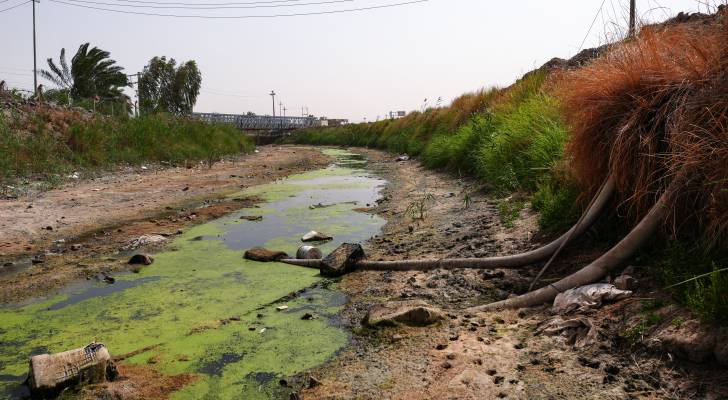An almost dried up stream flows between fields in Mishkhab, in Iraq's Najaf province. (May 24, 2025)
Iraq’s water reserves hit 80-year low
Iraq’s water reserves have dropped to their lowest levels in 80 years due to extremely weak rainfall and reduced flows in the Tigris and Euphrates rivers, a senior official at the Ministry of Water Resources told Agence France-Presse (AFP) on Sunday.
"The water shortage this year is worse than in 2024 and will force the government to reduce the size of cultivated farmland this summer," said ministry spokesperson Khaled Shamal.
With soaring temperatures and a drought that has persisted for at least five years, Baghdad has repeatedly criticized upstream dams in Turkey and Iran for significantly reducing the flow of the two rivers—considered Iraq’s primary water sources.
"Currently, Iraq receives less than 40 percent of its water entitlements," Shamal said on the sidelines of the 5th Baghdad International Water Conference, noting visibly low water levels in both the Tigris and Euphrates.
"The strategic water reserves were better last year—double what we have now," he added.
At the start of the summer season, Iraq should ideally have at least 18 billion cubic meters of water in reserve, Shamal said. "But right now, we have only about 10 billion cubic meters."
"This is the lowest reserve we've recorded in 80 years," he said, attributing the decline to scant rainfall and minimal runoff from snowmelt.
To secure drinking water for Iraq’s population of 46 million, authorities in recent years have scaled back agricultural land use.
"We will not be expanding the summer agricultural plan," Shamal confirmed.
"The plan is based on available reserves and inflows. Since both are low, this year’s strategy will be structural—focused on preserving core crops and existing farmland."
Only around 1.5 million dunams (approximately 370,000 acres) of green or productive farmland will be maintained this season, he said. By comparison, last summer, authorities allowed the cultivation of 2.5 million dunams of corn, rice, and orchards.
In response to the crisis, the Iraqi government has encouraged farmers to adopt modern irrigation techniques to reduce water consumption.
During the Baghdad Water Conference, Prime Minister Mohammed Shia al-Sudani announced a regional initiative aimed at protecting the Tigris and Euphrates rivers.
According to Shamal, the initiative seeks to rally international support, boost diplomatic pressure on neighboring countries, and promote bilateral agreements with Turkey, Syria, and Iran to safeguard Iraq’s water rights.




